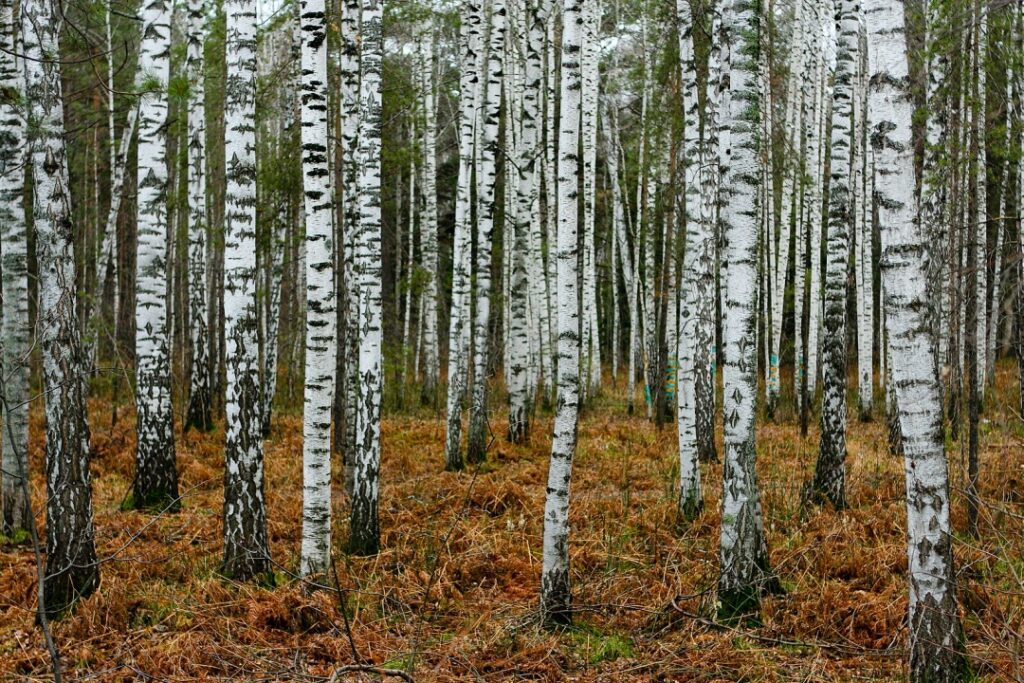
Brian Jeffrey Beggerly, CC BY-SA 2.0
Russia
Birch
Betula

Brian Jeffrey Beggerly, CC BY-SA 2.0
General Description / Cultural Significance
Russia ranks first in the world in terms of largest country with a total landmass of 57,510,500 square miles. It’s a transcontinental nation occupied by people of different cultures, backgrounds, and classes who all find connection and identity through the forests and countryside of their homeland. In Russia, the native birch tree (Betula), one of the most common trees in the country, has been a vital resource and also a powerful symbol integral to Russian culture and national identity. In ancient times, birch was a symbol of strength and protection. People believed that birch had a spirit that could guard them against diseases and other cursed events. The Slavs – ancient Russians – believed this to the extent that they planted walls of birches around their villages. They considered the birch tree a gift from God, and they celebrated the tree at the beginning of Spring with commencement.
Birch has been used for many practical needs, to make furniture, smoke foods, and dye textiles. Slavs used the bark as paper before paper was invented and kept written records on the birch bark as documents. They also used the bark for footwear. Since early times, birch has been of value to Slavic medicine and healing. Various parts of the birch tree are used for health purposes: bark, leaves, roots, juice, and sap. Also from the birch sap, birch syrup is made which has antiseptic and anti-inflammatory properties. A fungus (Inonotus obliquus) grows on birch bark that both heals the trees and is of great value to human health. Known as “chaga” it has been used as a folk remedy in Russia for centuries. The birch broom is essential to the Russian sauna. The leaves and buds of the branches release phytochemicals into the air sterilizing it and creating an inhaled tonic. Branches are also brought into the house and hung according to Slavic folklore.
To this day, the birch tree is a symbol of Russia, and walking in birch forests for well-being is a common practice. The birch is also the most popular tree in Russian art, the subject of numerous landscape scenes capturing the unique light of these white and silver forests that the Russian people delight in.
Climate Change / Conservation Status
Russia is warming at a dangerously rapid rate, heating up 2.5 times quicker than any other part of the world. Birch is vulnerable to climate change and the increasing temperatures, droughts, floods, and other extreme weather events are killing trees. To adapt, the birch tree is extending its territory, growing farther north and at higher elevations than ever before, in a trend that is unlikely to change any time soon. The rising temperatures are causing increased wildfires. In 2020, the country lost a forest area the size of Greece. The heat has also brought dangerous flash flooding that has wiped out entire villages in Siberia.
White birch, the most beloved plant in the country, is now in decline at lower altitudes, evidenced by the significantly reduced airborne pollen concentrations recorded of the tree. The effects are also making parts of Russia uninhabitable for citizens, pushing rural populations into urban areas. Despite the country’s tree planting projects, Russia is still one of the three largest contributing countries to global climate change in the world, putting birch trees into decline.
Sources
Conley, H. A., & Newlin, C. (n.d.). Climate Change Will Reshape Russia. Center for Strategic and International Studies. https://www.csis.org/analysis/climate-change-will-reshape-russia.
Jeffreys, T. (n.d.). The Most Popular Tree in Russian Art. Frieze. https://www.frieze.com/article/most-popular-tree-russian-art.
Rojo J, Oteros J, Picornell A, Maya-Manzano JM, Damialis A, Zink K, Werchan M, Werchan B, Smith M, Menzel A, Timpf S, Traidl-Hoffmann C, Bergmann KC, Schmidt-Weber CB, Buters J. Effects of future climate change on birch abundance and their pollen load. Glob Chang Biol. 2021 Nov;27(22):5934-5949. doi: 10.1111/gcb.15824. Epub 2021 Aug 17. PMID: 34363285.
Office of the Mission of the Russian Federation to the United Nations.

